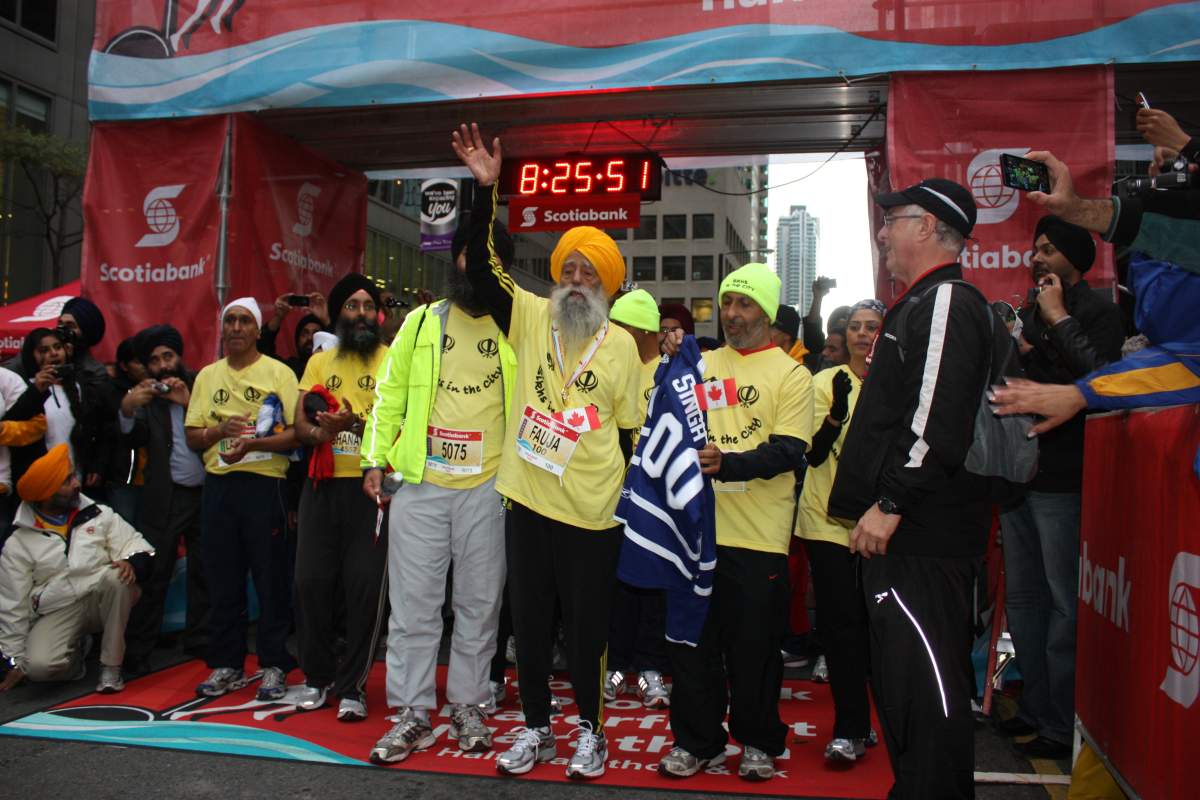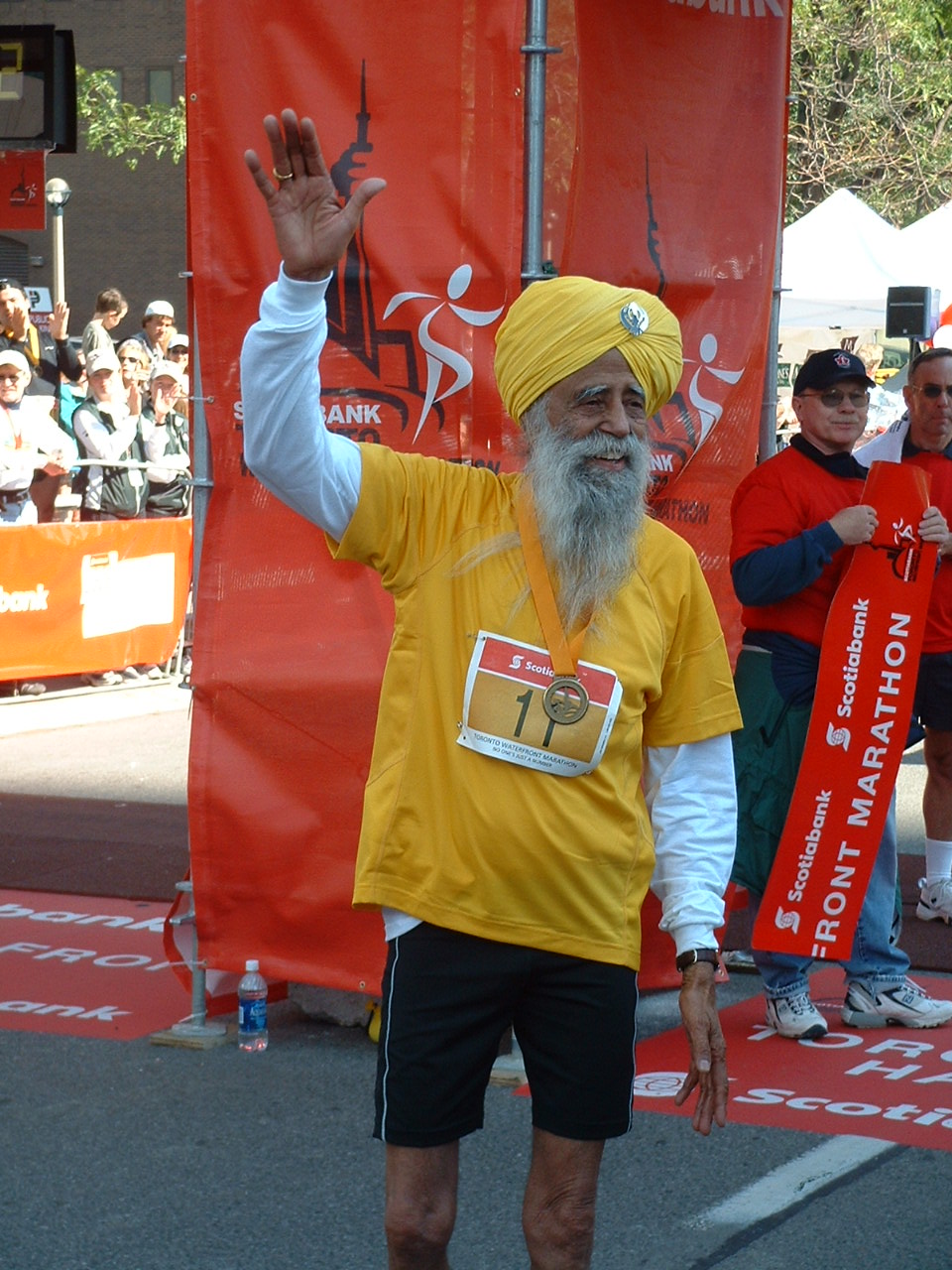Paramjit Dhillon will never forget the moment he first met Fauja Singh.
It was in 2003 when Dhillon was introduced to Singh through Alan Brookes, the race director of the Toronto Waterfront Marathon. Brookes had invited Singh – a celebrity in the United Kingdom for having just run a marathon at the age of 92 – to the then-unestablished event, unsure if he’d be willing to make the trip.
Singh was up for it, but with no knowledge of English, he needed a guide.
“We initially said no, he’s a celebrity in the U.K., you should put him with a bigger charity,” Dhillon, a member of the volunteer-run Guru Gobind Singh Children’s Foundation (GGSCF) in the Scarborough area of Toronto, told Global News.
“But Alan said he wants to be with people he can talk to, have a laugh with and feel like he’s not away from home.”
So the two connected, and what would unfold in the days, weeks, months and years afterwards would lead to Singh becoming the oldest man to run a full marathon during the 2011 TCS Toronto Waterfront Marathon.
‘He inspired so many of us’
Nicknamed the “Turban Torpedo,” the 114-year-old Singh died Monday after being hit by a car while crossing the road at his native village near Jalandhar in Punjab.
Local media in India reported that Singh sustained severe head injuries in the hit-and-run collision. He was taken to the hospital, where he later died.
Though his 2011 run was not recognized by Guinness World Records because he did not have a birth certificate, his accomplishment cemented his status as a running icon – and helped build a connection with Toronto that goes far beyond that moment of glory.

At the GGSCF, Singh would regularly speak to youth, which at one point included Parminder Flora – a self-described casual jogger-turned-avid runner thanks to Singh’s motivation.
“He inspired so many of us to take up and continue running,” Flora said.
“He showed us that there’s really no limits and that we can do a lot if we believe in ourselves. It can be as simple as putting one foot in front of the other.”
Each time Singh came to Toronto, his bond deepened with the GGSCF. When he reached 100 and decided to go for the record, Toronto – not his adopted hometown of London – was where he chose to make history.

Get daily National news
Get the day’s top news, political, economic, and current affairs headlines, delivered to your inbox once a day.
His coach, Harmander Singh, and the foundation were ready to help make it happen.
‘It was a magical moment’
“His age is none of my business. I wanted him to fulfil his dream,” Harmander said.
On one occasion, this meant banning Singh from taking vacations after his race times started slipping. On this stricter training plan, his times improved.
On race day – Oct. 16, 2011 – Dhillon ran a portion of the marathon alongside Singh before taking over as his hydration expert.
He said he made sure hot tea – never water – was ready for him at refreshment stations.

Singh ran the 2003 London marathon in under six hours, but age had slowed his pace. He was also dealing with public pressure, with thousands of people watching to see if he could break the record.
“He was struggling,” Harmander said. “People were pushing him faster than he needed to go.”
Supporters were running alongside him, but at that point, he had to lock in.
“He snapped back and said, ‘You’ve had your fun, now I’m going to listen to my coach,’” Harmander said, adding that he remembers fondly a phrase Singh told him.
“The first 30 kilometres, it’s like a fun fair, you enjoy the ride. After that, you’re talking to God.”
Event organizers made sure there was a celebration that matched the moment when Singh made it to the finish line.
“Our course limit with the city was six-and-a-half hours, but the police and the ambulance at the end of the race wouldn’t leave,” Brookes said.
“It was just a tremendous, joyous celebration.”
After logging 42.195 kilometres in just over eight hours, Singh became the oldest person ever to complete an official marathon.
Waiting for Singh at the finish line were 8,000 chapatis and samosas made by members of the GGSCF for him and his supporters to enjoy.
“It got dark because it took him so long,” Dhillon said. “When he turned the corner, everything went totally out of control. It was a magical moment; it was history.”
Singh’s legacy in Toronto lives on
Damanpreet Jaiswal was a toddler when Singh crossed the line in 2011, but she’s heard all the stories.
She’s one of Singh’s devotees from the GGSCF, following in his footsteps with a love for running that he would be proud of.
“I’m on my school’s varsity track team and I also run cross-country,” she said.
“I really understand how running meant so much to him because it means so much to me, it gave me health and happiness.”
Fauja Singh speaks at the inaugural Inspirational Steps event in Malton.
Courtesy: Guru Gobind Singh Children’s Foundation
Jaiswal still volunteers at the GGSCF, where stories about Singh are still regularly told.
“What I’ve learned is that Fauja Singh’s legacy isn’t really about running,” she said.
“It’s about how there’s really no limit to what we can do.”
Flora, who has a six-year-old daughter of her own now, is also still involved with the foundation.
“There have been children’s books written about him and my daughter has read them,” she said. “I think it’s really important to keep these stories alive.”
Beyond individual converts to the religion of running like Jaiswal, another of Singh’s enduring impacts on the Greater Toronto Area is Inspirational Steps. Inspired by Singh, it was launched in 2013 and was an event that saw runners race from gurdwara to gurdwara, sometimes covering 50 kilometres between temples in Scarborough and Mississauga.
It evolved over time and eventually became the Brampton Half Marathon, which benefits the GGSCF and five other GTA charities.
With Singh’s death still fresh, every organization he touched is still trying to figure out how best to honour his legacy. Dhillon said there are plans in motion to do a memorial run for Singh.
Brookes said the next running of the Toronto Waterfront Marathon will feature memorials and celebrations for its most famous finisher. London is also remembering his achievements, with the Sikhs in the City running club planning to build the Fauja Singh Clubhouse.
“Fauja was an absolute inspiration,” Brookes said.
“He was a leader, a real gentleman, a role model, and we owe him an inestimable debt for what he brought to us.”







